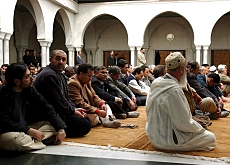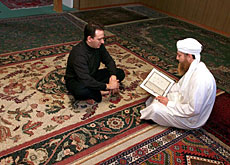Court rules veil is no obstacle to citizenship

Switzerland's Federal Court has overturned two decisions by local assemblies to refuse citizenship on the grounds of women wearing a religious veil.
Muslim organisations welcomed the rulings, which were announced on Wednesday, as a “step forward”. Naturalisation procedures have been a controversial issue over the past few years.
Under the Swiss federal system, communities also have a say on naturalisation issues.
The court ruling came after two local assemblies in canton Aargau, in northern Switzerland, rejected applications for Swiss citizenship by a Turkish woman and a Bosnian couple last year.
Objectors said the veil was a sign of inequality between men and women and was therefore unconstitutional.
But Switzerland’s highest court found that wearing a veil was an expression of religious beliefs, which are protected under the Swiss constitution. The veil in itself was not a sign of the debasement of women, the judges wrote.
The court urged citizens to look beyond their prejudices and said the fact that a Muslim woman wore a veil did not mean she was flouting the basic values of Swiss society.
Hisham Maizar, president of the Federation of Islamic Organisations in Switzerland, agreed with the court’s ruling.
“I think it is a step in the right direction. We will see what kinds of decisions follow afterwards. We have learned to be a little bit cautious,” he said.
“We are not looking for a sort of assimilation but a sort of integration. Integration means you accept me as I have my own identity. Since this woman is here and likes to keep her identity, this is in accord with federal law and her [personal] freedom.”
Rejected
One of the cases involved a 40-year-old Turkish woman who had lived in Switzerland since 1981 and was well integrated. The communal assembly in Buchs rejected her application by 19 votes to 15.
In the second case, a Bosnian man’s application was rejected by Birr officials because his wife wore a veil.
The judges ruled however that his wife, whose request was also turned down, had not been discriminated against as the objection was based on language problems and gaps in her knowledge of civic matters.
Saïda Keller, president of the Swiss-based Forum for a Progressive Islam, said these cases would force people to think about the veil and “consider that not all women who wear a veil are a danger to society”.
“I think that the decision by the Federal Tribunal is absolutely correct because one must not take the veil as a measure to judge whether a person is capable of being a citizen of this country or not,” she said.
“If it is argued that it’s a sign of inferiority of women to men, it is not correct. One must look closer at the relationship between a woman and a man in that case.”
Janine Dahinden, professor for Transnational Studies and Social Processes at Neuchâtel University, said the court had made an important decision.
“I think it is a victory for democracy. We are living in a pluralistic society and I think the court respected that pluralistic society. I think it is very good that these women went all way to the Federal Court.”
The communal assemblies of Birr and Buchs will review the cases again in June.
Controversial issue
Local decisions on citizenship applications have been a controversial issue over the past few years.
Swiss citizens are due to vote on an initiative that aims to enshrine communities’ right to decide on naturalisation requests in the constitution.
Launched by the rightwing Swiss People’s Party, it demands that voters be free to decide on how to proceed on citizenship questions and that appeals against negative decisions be no longer possible.
The proposal challenges a 2003 Federal Court ruling, which effectively meant that citizenship requests could not be decided at the ballot box, by local parliaments or other assemblies.
Judges said failed candidates had to be given a reason for their rejection, to avoid arbitrary decisions.
Voters in the town of Emmen near Lucerne had, for example, turned down applicants from the Balkans, apparently only on the basis of their origin. This pattern was repeated in other parts of central Switzerland.
swissinfo, Jessica Dacey
An application for citizenship in Switzerland can be made after living in the country for 12 years (although this can be shorter for citizens of some countries).
Switzerland grants naturalisation to people who are well integrated and are familiar with the judicial system.
Citizenship is granted by cantons and communes and the procedure can vary greatly from one place to another.
In 2004, the Swiss people rejected a constitutional article proposing simplified naturalisation of second and third generation foreigners.
In 2006, a record 46,700 naturalisations were processed in Switzerland. But the country still has one of the lowest rates in Europe.
Switzerland has 20 per cent foreigners among its seven million inhabitants.

In compliance with the JTI standards
More: SWI swissinfo.ch certified by the Journalism Trust Initiative












You can find an overview of ongoing debates with our journalists here . Please join us!
If you want to start a conversation about a topic raised in this article or want to report factual errors, email us at english@swissinfo.ch.